
Related
Guests
- Reed Brodywar crimes prosecutor.
In Part 2 of our interview with human rights attorney and war crimes prosecutor Reed Brody, he says potential International Criminal Court charges of war crimes for high-ranking Israeli officials could include “the use of starvation as a tool of war, the power of the the hindering of humanitarian assistance in violation of the Geneva Conventions.” He also responds to the International Court of Justice’s rejection of a request by Nicaragua to order Germany to halt exporting arms to Israel. “A similar case on the United States, if it could be brought, would have a very different outcome,” Brody notes. He is the author of To Catch a Dictator: The Pursuit and Trial of Hissène Habré.
Transcript
AMY GOODMAN: This is Democracy Now!, democracynow.org. I’m Amy Goodman, with Juan González.
Prosecutors from the International Criminal Court have interviewed staff from Gaza’s two biggest hospitals — this is according to Reuters — in what’s being described as the first confirmation that ICC investigators are speaking to medics about possible war crimes committed by Israel in Gaza. Palestinian officials have demanded investigations after hundreds of bodies were exhumed in mass graves at both Nasser and Shifa Hospitals following Israeli raids on the medical centers.
This comes as the International Court of Justice has rejected a request by Nicaragua to order Germany to halt exporting arms to Israel, but the court declined to throw out the case. Nicaragua had accused Germany of violating the Genocide Convention by providing military and financial aid to Israel.
For more, we bring you Part 2 of our interview with Reed Brody, a war crimes prosecutor and author of the book To Catch a Dictator: The Pursuit and Trial of Hissène Habré.
Reed, thanks so much for continuing to stay with us from Barcelona, Spain. In Part 1 of our discussion, we talked about the implications of the ICC possibly indicting Israeli officials for war crimes. We did not get to talk to you about the International Court of Justice. Can you explain this case that Nicaragua has brought against Germany, and the ICJ not rejecting it outright, but actually taking a stand?
REED BRODY: Sure, Amy. First, if I could just continue for one minute on the ICC, what we’re expecting from the ICC would be indictments probably targeting the highest-ranking Israeli officials — Benjamin Netanyahu, the defense minister, the chief of staff. And these indictments would probably be for matters of state policy, things like the use of starvation as a tool of war, the hindering of humanitarian assistance in violation of the Geneva Conventions. These things are more likely to be the subject of any first indictment than, say, targeting decisions, things like a bombing of a hospital, of a school, of medical facilities.
And why is that? Because those things require — and you were just talking about the ICC speaking to people at Al-Shifa Hospital — those kinds of indictments would require a very detailed factual investigation, whereas a decision, for instance, to block humanitarian assistance, you know, to use food as a weapon are policies that can be traced back much more easily to the leadership, in the same way that in the case of Russia and Ukraine, the ICC prosecutors’ indictment of Vladimir Putin was not for Bucha and the crimes there or for the bombing of the theater in Mariupol. It was for the transfer of Ukrainian children from Ukraine to Russia, a policy that Vladimir Putin himself had endorsed and embraced. So it becomes much easier to trace that to the leadership. And then we saw, in the case of Russia, that a year later we had the first indictments of high-ranking generals for targeting decisions. So, we would expect that any indictments that come down from the ICC would be based on things that could be considered to be a matter of state policy.
And I should also mention that I would be 100% certain that in addition to indictments of Israeli officials, you would have indictments of Hamas officials for war crimes committed on October 7th.
AMY GOODMAN: Reed, we just have this breaking news, and we want to get your response to it. Turkey is due to join South Africa in its case against Israel at the International Court of Justice. So, before you address Germany and Nicaragua, the significance of what this means — this is according to the Turkish foreign minister, announcing at a news conference today — to explain that case and what it means for a second country to support South Africa’s claim that Israel is committing genocide in Gaza?
REED BRODY: Well, under the Genocide Convention, the obligations that Israel owes are owed to all state parties to the convention. It’s erga omnes partes. And that’s why South Africa, even though it’s not directly affected by Israel’s policies, could bring the case. And, in fact, a number of countries, including even Canada, have, in one way or another, said that they are going to intervene. And what we’re seeing is a growing number of countries — and I don’t have the list in front of me — who have indicated, as Turkey has said today, that they will join this, that Israel’s obligations are owed to all of the states that are members of the Genocide Convention.
I should add that this is how, earlier, Gambia, little Gambia, was able to bring a genocide case against Myanmar for violation of the Genocide Convention. And I should go back even further and say in a case I was involved in, Belgium brought a case against Senegal under the Torture Convention for refusing to prosecute Hissène Habré.
So, we’re actually seeing a very interesting development in international law over the last 10 years, which is the use of this erga omnes principle, the use of this idea that when you ratify a human rights convention, whether it’s the Genocide Convention or the Torture Convention, it’s not only the people who are directly affected, but the entire community of states parties has an interest. And what we’re seeing is that Israel’s policies have been so condemned around the world that more and more states want to be a part of this process.
JUAN GONZÁLEZ: And, Reed, going back to the International Criminal Court, in Washington, a number of lawmakers, both Republicans and Democrats, have threatened to retaliate against the ICC if it takes action against Israel. What power does the U.S. have to retaliate if it’s not even a party to the convention?
REED BRODY: Well, this brings us back to — you know, this brings us back to the Bush and Trump administrations. You know, the U.S., again, was one of the seven countries, under the Clinton administration, to vote against the ICC. But in the last days of his administration, Clinton actually signed the treaty. The Bush administration came in. John Bolton unsigned the treaty. And then they went, really, on this — on this jihad against the International Criminal Court. And that included, for instance, forcing, I mean, dozens of countries, mostly small countries and economically dependent countries, to sign treaties with the United States to say that they would never transfer an American official to the International Criminal Court. Congress passed, and Bush signed, what was called the American Servicemen’s Protection Act, the so-called Hague Invasion Act, that authorized the U.S. government to take any and all necessary means to rescue any American who was brought up before The Hague. And so, you had this real — you know, I mean, the International Criminal Court was anathema to the United States.
Then the Democrats came in, most recently under Biden, and the U.S. adopted, you know, what they call a “good neighbor” policy to the ICC. It wasn’t going to become a member of the ICC, but, particularly in the aftermath of Russia’s invasion of Ukraine, when all of a sudden the ICC sprung into action and became an ally, I mean, you had bilateral congressional delegations — I think, previously, the late John McCain, but Lindsey Graham and others — going to the ICC. You had, in particular, Lindsey Graham and other Republican and Democratic lawmakers loosening the U.S.’s prohibitions against supporting the ICC. We saw a big controversy particularly over whether the United States could give information to the ICC that would lead it to — in its investigation of Russia. We saw that the State Department was in favor, that Lloyd Austin, the Defense Department, was against because of the precedent it would create.
But now that the ICC has gone back and really crossed — you know, I mean, obviously, American policy towards the ICC has been driven by two particular — three particular factors. One is, the U.S. loves international justice and is really a leading proponent of international justice, when it doesn’t affect U.S. national interests. So, we’ve seen the United States, you know, very involved in Gambia, where I’m involved, in Liberia, in Cambodia, in many countries around the world, in the support of international justice. But the two places where it will not accept anything are Israel and the United States.
JUAN GONZÁLEZ: Reed, I wanted to go back to the International Court of Justice, which the U.S. — convention, to which the U.S. is a party. What do you make of the decision this week of the International Court to reject a request by Nicaragua to order Germany to halt military and other aid to Israel?
REED BRODY: Well, it’s very interesting also the way you phrased the question, Juan, because the United States is a member, I mean, of the International Court of Justice. But the ICJ is a consent — has consent-based jurisdiction. So, the reason that Nicaragua brought the case against Germany and not against the United States, which is, of course, Israel’s principal supplier of military assistance, is because the United States has not given its consent to this kind of case. And so Nicaragua was left to go, you know, to the second best, which was Germany.
And, in fact, the ICJ’s decision not to order, you know, emergency preliminary measures was based on the facts that it found. Basically, it said that Germany has recently diminished its military assistance to Israel, that since this war began, it has only given four, I believe, licenses for nonoffensive weapons to Israel, and that Germany has a very strong internal — and that Europe, in general, has, but Germany, in particular — a very strong internal vetting policy to ensure that the end use of military assistance is not for committing crimes in violation of the genocide and other conventions. All of those — and so, therefore, the court determined that it was not necessary to grant these emergency measures, because Germany was not, in fact, doing all of these things.
Now, all of those would be the opposite for the United States, which is, you know, continuing to provide Israel with offensive, lethal weapons. And the court, while it did not grant these emergency measures, it did, as Amy pointed out at the top of the show, make a — remind all state parties that they have an obligation under the Genocide Convention, as well as under other treaties, not to provide military assistance that is used for the commission of crimes.
AMY GOODMAN: So much, Reed Brody —
REED BRODY: So, you know, you could say that Germany, you know —
AMY GOODMAN: Go ahead, Reed.
REED BRODY: — the case against Germany failed on the facts, and it wasn’t thrown out. But a similar case on the United States, if it could be brought, would have a very different outcome.
AMY GOODMAN: Reed Brody, war crimes prosecutor, author of To Catch a Dictator: The Pursuit and Trial of Hissène Habré. To see Part 1 of our discussion, go to democracynow.org. Reed was joining us from Barcelona, Spain. I’m Amy Goodman, with Juan González. Thanks so much for joining us.


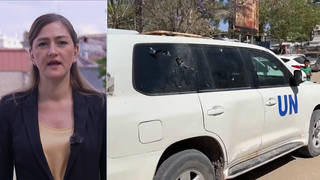
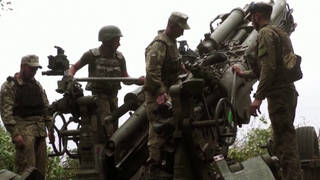
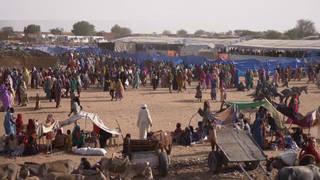
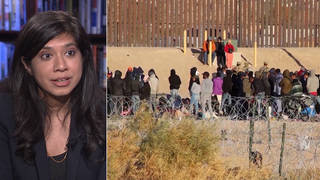




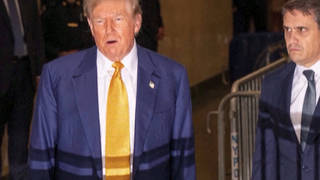
Media Options